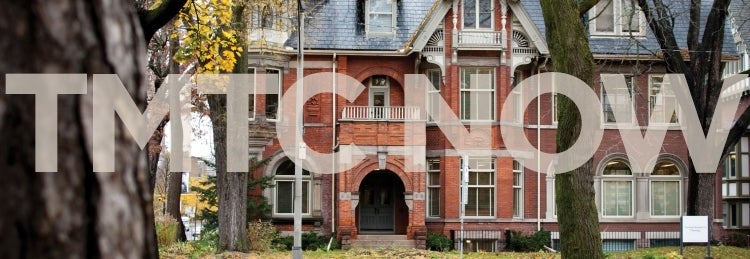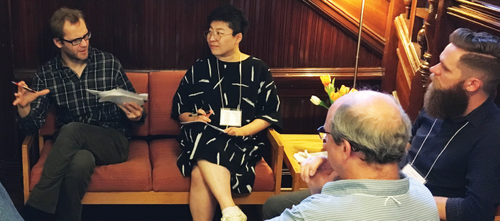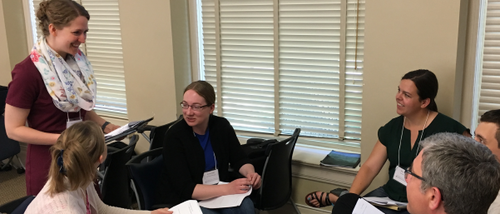
Volume 11, Number 1, Fall 2018
Editorial
 By Kyle Gingerich Hiebert, TMTC Director
By Kyle Gingerich Hiebert, TMTC Director
My first year as director of Toronto Mennonite Theological Centre (TMTC) has flown by. Punctuated by a range of events such as doctoral defences and graduations, graduate teaching and advising, scholars forums, book launches, the annual gathering of Mennonite scholars and friends at the AAR/SBL, and capped off with our biennial graduate student conference, the life and work of TMTC is both varied and vibrant.
TMTC operates at the intersection of a number of remarkable communities, all of which have graciously welcomed me into their midst. As I’m learning is the traditional Grebel custom, I was officially inducted with a welcome coffee break and have benefited tremendously from the support of Jeremy Bergen who has helped orient me to the role. At the Toronto School of Theology (TST) I have been welcomed as a member of the Academic Council and it is clear that our presence is valued amongst the seven colleges that make up TST. TMTC is also supported by an Advisory Council made up of representatives from Mennonite educational and denominational institutions across Canada and the United States and I am excited about bringing this group together in Toronto in the Fall of 2019.
A community of students drawn from TST’s member colleges and McMaster University as well as a burgeoning group of fellows make up the core of TMTC’s regular activity in Toronto and it is something of a gross understatement to say that the research being done by those associated with TMTC is creative and engaging. The extent to which this is the case was on full display this past June at our biennial graduate student conference in Toronto, which drew 22 student presenters from 15 different institutions across North America. I am immensely grateful for the opportunity to learn alongside these gifted students and look forward to thinking about new ways to support their work. One such opportunity that is also connected to the wider Anabaptist/Mennonite scholarly world is the revitalization of the Anabaptist Mennonite Scholars Network (AMSN), which TMTC is undertaking in partnership with Anabaptist Mennonite Biblical Seminary (AMBS), and I would welcome any feedback and input about what shape this network might take.

Peace Church Theology in Toronto
By Hyejung Jessie Yum, TMTC Associate and PhD student at Emmanuel College
Peace Church Theology, taught by Professor Jeremy Bergen, was a helpful course for understanding the trajectory of the development of peace theologies. Course readings covered a wide range of topics such as peace theology in its early stages, various ecumenical dialogues, debates between pacifism and realism/just war theory, feminist and womanist voices, and the role of diverse geopolitical contexts. The readings were enriched by active discussions with diverse range of colleagues from different traditions and cultures including Catholics, evangelicals, liberals, as well as Ethiopians, European-Canadians, Koreans, and Paraguayans.
I also benefited from the support of Professor Bergen throughout the course and personally kept a question in my mind throughout the class: “How should I deal with John H. Yoder’s theology after his sexual abuse, as a Korean Mennonite woman studying theology in North America?” In doing peace theology, my identity, shaped by hybrid contexts, signifies that I need to consider the difference between meanings of peace theology in the North American and Korean contexts as well as differences in perspectives and experiences between being an ethnic minority woman in comparison to the European male theologians still largely considered as authoritative in churches and academia. These gaps in perspectives provoke questions. Moreover, Yoder’s sexual violence made me deeply aware that peace theology seeking nonviolence cannot itself be free from violence that results from imbalances of power. This realization calls me to a reoriented method of doing peace theology with a fundamental question: “peace for whom and peace by whom?”
In my theological struggle, Professor Bergen’s listening, support, and encouragement in classes and meetings helped me process my questions and thoughts and encouraged me to add my voice to and for the Anabaptist community. Further, studying a variety of scholars in peace traditions led me to more extensively engage in peace theology and aided a critical understanding of Yoder’s peace theology and ethics. Through the process, I became more convinced that reorienting peace theology needs to be accompanied by a shift from a foundation of well-organized idealized discourse to a peace theology which continuously reflects the experiences of those who are suffering and marginalized in our messy reality.
Mennonite Scholars and Friends at the AAR/SBL
By Kim Penner, TMTC Research Fellow
 The theme of the 2017 Mennonite Scholars and Friends Forum at the American Academy of Religion (AAR)/Society of Biblical Literature (SBL) in Boston, MA, was supersessionism. On the panel were John Kampen, Methodist Theological School in Ohio, Maxwell Kennel, Ph.D. student at McMaster University, and Lois Barret, Anabaptist Mennonite Biblical Seminary, responding. I served as the moderator of the forum.
The theme of the 2017 Mennonite Scholars and Friends Forum at the American Academy of Religion (AAR)/Society of Biblical Literature (SBL) in Boston, MA, was supersessionism. On the panel were John Kampen, Methodist Theological School in Ohio, Maxwell Kennel, Ph.D. student at McMaster University, and Lois Barret, Anabaptist Mennonite Biblical Seminary, responding. I served as the moderator of the forum.
In his paper, “The Gospel of Matthew and Antisemitism,” Kampen argued that the Gospel of Matthew is a product of sectarian impulses evident among various groups in the late first century Jewish community. This, he claimed, is important context for interpreting how the text has contributed to the development of antisemitism. According to him, the gospel of Matthew is a statement of a person(s) associated with the Jewish community who are followers of Jesus and are making a case for how and why these followers should live their Jewish life.
Kennel’s paper, “Emancipatory History: Anabaptist Restitution and Jacob Taubes’ Occidental Eschatology,” raised questions regarding the values and risks of Anabaptist restitutionist notions of time as they resemble those of supersessionsim. He argued that restitutionism and supersessionism both depend on a problematic view of time as separated into an ideal before and after. Restitutionism views ecclesial history before Constantine as embodying the values of the New Testament and after Constantine as the fall of the church given the marriage of church and state. Supersessionism, on the other hand, ignores Israel in the periodization of time and history by valuing the New Testament period over the Hebrew Scriptures and that period of history.
Lois Barrett responded to each paper, after which there was a time of lively and engaged discussion.
The annual Mennonite Scholars and Friends events are organized by TMTC on behalf of fifteen Mennonite and Anabaptist-affiliated institutions and are open to any who wish to attend.

TMTC Fellow Spotlight
By Jason Reimer Greig, TMTC Visiting Fellow
Even after spending 11 years in L’Arche, I never went into graduate school thinking disability would be at the core of my academic work. Yet the faces and lives of persons I encountered in L’Arche continually impressed themselves upon my theological study and reflection. Being befriended by persons like Brian and Angus worked a revolution in my heart and mind, challenging and transforming everything I had learned about what it means to be a Christian and to be a human being.
I have learned from these persons about the crucial role of the body in the life of faith, and how important practices are in becoming Christian bodies belonging to a Body. Persons considered as intellectually disabled have taught me about understanding vulnerability not solely as an obstacle to flourishing, but as an aspect of the human condition that makes us available to others. Living at the pace of the slowest has showed me both the slowness of relational and theological time, and how the impulse of speed inherent in our late modern culture forms us into alienated and desperate consumers. Being with and learning from persons deeply dependent has exposed the illusion of the modern dream of self-sufficiency and highlighted the profoundly social nature of the human person.
Sharing life with persons labelled intellectually disabled has transformed the way I theologize and see the world. Communities like L’Arche offer the church living parables in what the Kingdom of God might look like for all human persons in our contemporary world. L’Arche gives the church an illustration of what a peace culture might look like and practice in an accelerated world seeking fulfillment and purpose.
Recent Scholars Forums
April 18, 2018: Trent Voth, “Usurping the Cross: Mark’s Peripeteia as Subversive Strategy.”
March 13, 2018: Allison Murray, “Gender Performance as a Mark of Faith: Historical Parallels in Evangelical and Mennonite Communities”
February 7, 2018: Jason Reimer Greig, “L’Arche, Time, and Being a Peace Church”
January 17, 2018: Isaac Friesen, “Bishops, not Pawns: The Roots and Reflexivity of Coptic Interfaith Programs in Provincial Egypt”
December 5, 2017: Kim Penner, “Conversations about Erotic Peacemaking”
November 15, 2017: Andrew Martin, “Reflections of Medieval Monasticism in Anabaptist Spirituality”
October 25, 2017: Pablo Kim Sun, “Non-triumphalist Engagement of the Churches in a Post-secular Society”
Book Notes
Kyle Gingerich Hiebert, TMTC Director, published The Architectonics of Hope: Violence, Apocalyptic, and the Transformation of Political Theology (Eugene: Cascade, 2017).
Lydia Neufeld Harder, TMTC Senior Fellow, published The Challenge is in the Naming: A Theological Journey (Winnipeg: CMU Press, 2018).
Maxwell Kennel, TMTC Associate and PhD student at McMaster University, edited Desire for Living: Regard, Concern, Service, and Love by Robert Friedmann (Eugene: Wipf & Stock, 2018).

TMTC A. James Reimer Award
 Isaac Friesen is the 2017 winner of the A. James Reimer Award. He is a PhD candidate in the Department of Near and Middle Eastern Civilizations at the University of Toronto. Isaac’s interdisciplinary research examines cultures of interfaith coexistence and everyday ethics in provincial Egypt. He is currently in the process of writing his dissertation which is titled “Navigating Tradition in Provincial Egypt: The Avenues and Ethics of Muslim Crossing into Coptic Spaces.” Isaac became passionate about the Middle East during his three-year service term with Mennonite Central Committee in Egypt and looks forward to a lifelong collaboration between his academic work and the institutions of the Mennonite Church.
Isaac Friesen is the 2017 winner of the A. James Reimer Award. He is a PhD candidate in the Department of Near and Middle Eastern Civilizations at the University of Toronto. Isaac’s interdisciplinary research examines cultures of interfaith coexistence and everyday ethics in provincial Egypt. He is currently in the process of writing his dissertation which is titled “Navigating Tradition in Provincial Egypt: The Avenues and Ethics of Muslim Crossing into Coptic Spaces.” Isaac became passionate about the Middle East during his three-year service term with Mennonite Central Committee in Egypt and looks forward to a lifelong collaboration between his academic work and the institutions of the Mennonite Church.
The award is given annually to a Mennonite student completing an advanced degree program at the Toronto School of Theology or another local university, who actively participates in TMTC programming. The award was established to recognize the work of A. James Reimer in establishing the Toronto Mennonite Theological Centre. TMTC provides a Mennonite presence at the Toronto School of Theology in order to engage in theological conversation at an advanced degree level as well as to support Anabaptist students pursuing advanced degrees.
TMTC Staff
- Kyle Gingerich Hiebert, Director
- Pablo Kim Sun, Administrative Assistant
TMTC Fellows
- Jason Reimer Greig, Visiting Fellow
- Lydia Neufeld Harder, Senior Fellow
- Sarah Johnson, Visiting Fellow
- Kim Penner, Research Fellow
- John Rempel, Senior Fellow
Advisory Council
- Anabaptist Mennonite Biblical Seminary
- Canadian Mennonite University
- Eastern Mennonite University
- Mennonite Church Canada
- Mennonite Church Eastern Canada
- Mennonite Education Agency (Mennonite Church USA)
- Toronto United Mennonite Church
Contact Info
Toronto Mennonite Theological Centre
47 Queen’s Park Crescent East
Toronto, ON M5S 2C3
416-978-6078
mennonite.centre@utoronto.ca




